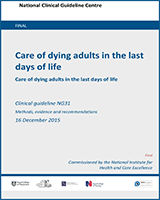| Review question | In patients in their last days of life, is clinically assisted hydration effective in improving symptoms and general comfort? |
| Objectives | To identify whether clinically assisted hydration is effective in the clinical management of a patient in their last days of life. |
| Population | Adult people in the last days of life who are not maintaining sufficient oral hydration. |
| Interventions | Clinically assisted hydration
Enteral hydration (via nasogastric tube, gastrostomy or jejunostomy) Parenteral hydration (intravenously or subcutaneously).
|
| Comparator |
|
| Outcomes | Critical:
Quality of life (either patient-rated, clinician-rated, carer-rated) Symptom improvement on rating scales pre and post intervention.
Important:
Hydration status using both objective and subjective measures (for example, hydration of oral mucosa, measuring vital signs and skin turgor). Adverse events both procedural (phlebitis, or line infections, for example) and from positive fluid balance (for example, pleural effusions). Subjective ratings from informal carers on quality of care received. Biochemistry results including urea, creatinine and sodium.
|
| Study design |
RCT Prospective cohort study Systematic Review
Exclusions:
|
| Population size and directness | No restrictions. |
| Setting | All settings. |
| Search strategy | The databases to be searched are Medline, Embase, The Cochrane Library, CINAHL, PsychINFO
Studies will be restricted to English language only. |
| Review strategy | Appraisal of methodological quality.
The methodological quality of each study will be assessed using NICE checklists and the quality of the evidence will be assessed by GRADE for each outcome.
Synthesis of data.
Meta-analysis will be conducted where appropriate.
Data on the following groups will be presented separately, if the evidence allows:
|
